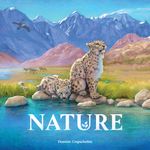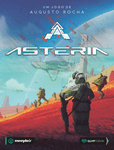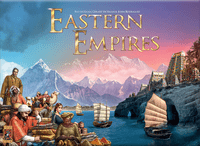How a decade on the Magic Pro Tour and a decade designing the Evolution series led to my grail game.
Hello, friends, Dominic here — designer of Nature, Evolution, Oceans, and Wits & Wagers. I want to share why Nature is my most ambitious project yet. It’s more than a redesign of Evolution; it’s the realization of a design dream I’ve chased for over a decade.
My Design Philosophy
A game needs two things to become an established brand that lasts for generations: It must be inviting to new players, and it must have enough depth that experienced players regularly bring it back to the table. In short, it needs a community of fans that grows faster than it shrinks.
I’ve been redesigning Evolution over the past six years with two corresponding goals:
1) Make the core game easy to teach.
2) Create a modular system that’s easily expandable.
The result is Nature, a gateway into a limitless world of ecosystems.
My Eternal Quest
Nature is my grail game.
It’s the game I’ve been trying to design for over a decade, though for most of that time I wasn’t aware of what I was trying to accomplish.
In 1995, I played in the first professional Magic: the Gathering tournament, followed by nearly every one afterwards for the next five years (except in summers when I was captaining an Alaskan fishing boat).
Wizards of the Coast used my image on a promotional poster when I was the Virginia State Champion in 1996. That’s me a decade later standing on the poster.
Magic changed everything. I’d grown up playing board games with my family three times a week, but Magic offered something new: a limitless world to explore with a vibrant community, and the thrill of discovering powerful synergies no one knew about, not even the game designer!
I wanted to share that experience with the people I loved most — to hook them into playing with me — but I failed on every occasion. My family, childhood friends, college friends, even my dad (who taught me chess when I was four). No one was interested.
The experience Magic offers can be transformational, but the barrier to entry is high. For the past decade of my life, I’ve been trying to bring that experience to a wider audience so that others could share it with their closest friends.
With Nature, I finally feel like I’ve arrived. It accomplishes everything I originally intended for Evolution.
Why I Redesigned Evolution
Nature began as notes scribbled in the margins of an Evolution sketchbook — ideas for expansions and ways to improve the core experience. For years I watched players at conventions, stores, and online, listening closely to what they loved and where they stumbled.
When I released the second expansion, Evolution: Climate, I realized it took twenty minutes just to switch between expansions. That’s what killed Evolution for me. Fans wanted more content, but I couldn’t stand another lengthy set-up. It’s not something I’d tolerate from a game in my own collection.
I planned to solve the issue before releasing the next Evolution expansion, but after years of trying, I realized the problem couldn’t be solved within Evolution‘s architecture. I tried to move on, but something kept bringing me back. That dream of a sharable, limitless world remained unfulfilled. It tugged at me.
And then came the issue that hit me hardest.
Brought to Tears
One night I read a Reddit post from someone who’d played Evolution for the first time. The experience was so brutal they went home and cried. Days later, they posted a warning to others.
This post was painful to read, but it carried an important message. Despite its success and awards, Evolution could deliver a terrible experience to new players. They’d make innocent mistakes and end up helpless — easy prey for others. What bothered me most was that Evolution was many people’s first modern board game, often played in a classroom.
In 2015, Professor Stuart West published an article in Nature magazine reviewing evolution-themed board games. Evolution was his clear favorite, and Professor West began using it in Oxford’s evolutionary biology department. The game was later featured in Science magazine and the International Journal of Organic Evolution, which looked at ten games before concluding:
Those articles sparked an explosion of Evolution in classrooms worldwide. I was even invited — expenses paid — to speak at a conference for evolutionary scientists in Croatia.
Seeing my game adopted as an educational tool was a dream come true, but it was also profoundly unsettling. Evolution was too complicated for most people outside of the hobby, and the idea that it could bring someone to tears in a classroom was deeply troubling. I knew I could make the game easier to teach, equally scientific, and far less punishing.
A Gateway to an Endless World
From 2019 to 2021, I rebuilt the foundation of this game as Nature to make it 1) more accessible, 2) less punishing, 3) easily expandable, and 4) scientifically grounded.
To start, I played Nature more than fifty times with my son and hundreds more against myself. I rarely used the same rules twice. To make Nature simpler and deeper, I had to find rules that were both elegant and provided layers of strategy.
Playtesting with Elizabeth Hargrave and Matthew O’Malley in early 2021.The prototype used Evolution art and components.
The Perfect Catch-up Mechanism
Much of those three years was spent chasing the perfect catch-up mechanism. I tested over fifteen systems to soften the blow of being attacked without removing the need for defense. Nothing worked until I realized the real issue: snowballing.
Engine building and snowballing are two sides of the same coin. A game engine snowballs when the resources produced by an engine can make the engine better. It’s exciting when your engine grows exponentially, but demoralizing when an opponent’s engine is clearly uncatchable.
Snowballing is worse in an interactive game in which your engine can be attacked because once you’re behind, you stay behind. Many engine builders avoid this by becoming multiplayer solitaire, but Nature couldn’t becuase real ecosystems are full of dynamic interactions.
A 2021 prototype using new concept art and new components
Evolution Versus Nature
Evolution is an engine-building game that snowballs. When you make a mistake, you pay for it immediately with fewer points that round, and you pay for that mistake again in every future round by competing with fewer resources. At the same time, players that get off to a good start draw extra cards in the next round, allowing them to increase their lead. The rich get richer, and the poor get poorer.
Nature breaks that cycle by removing the snowballing elements. When you make a mistake, you score fewer points that round just like in Evolution, but you will start the next round with the same amount of resources as everyone else. This gives you a chance to outplay your opponents in each subsequent round to make up for an early mistake.
After three years of searching, I finally discovered the perfect catch-up mechanism…is not to have one.
Playtesting the Flight module in 2021
Fulfilling the Dream
Once the core gateway experience was solid, I turned to modules — the key to making Nature a limitless world of endless discovery. There are three distinct stages on the path:
Stage 1: Play the core game.
Although meticulously crafted to be as accessible as possible, Nature still has a learning curve for casual gamers. That’s the price of a thematic experience with layers of depth.
Stage 2: Play with one module.
My niece played six or seven times before asking to try the Flight module. I was nervous because the new traits generated questions, but when I asked afterward whether she wanted to play Flight again or return to the base game, she paused, thought deeply, and slowly asked, “What are some of the other modules?” I smiled. It was clear she was hooked.
I often describe stage 2 as going from high school to college. The structure is familiar, but everything feels fresh and exciting again. Each module provides a unique experience:
Flight: Find Safety in the Skies!
This module allows players to avoid conflict.
Jurassic: Size is Power!
This module brings out giant predators, making you feel invincible when others can’t hurt you.
Natural Disasters: Adapt to the Chaos of Mother Nature!
This module creates memorable stories for those who like to think on their feet.
Arctic Tundra: Survive at the Edge of the Livable World!
This module is for players who enjoy a bitter challenge.
Amazon Rainforest: The Amazon has Secrets!
This module conceals animals in the dense canopy for surprising reveals and unexpected bluffing.
Every module has been carefully curated and tested thousands of times by our playtesting community to evoke a specific feeling.
Stage 3: Combine several modules
This is where the frontier begins, where you step out of my carefully curated world into unchartered territory. I’ve explored only a small fraction of the 96 combinations that currently exist (soon to be 736). This world is wild, untamed, and yours to explore.
I’ll be there with you, discovering new strategies and finding powerful synergies.
When you reach Stage 3, I hope you join the NorthStar Discord community to share your discoveries and teach me about this limitless world I’ve helped create.
Dominic Crapuchettes
NorthStar Game Studio

/pic8115796.jpg)
/pic739768.jpg)
/pic9158451.jpg)
/pic9158471.jpg)
/pic4374105.jpg)
/pic9157644.jpg)
/pic9158466.jpg)
/pic9158465.jpg)
/pic8143073.jpg)
/pic8143074.jpg)
/pic9032475.jpg)
/pic9032527.jpg)
/pic9033720.jpg)
/pic9033730.jpg)
/pic9033732.jpg)
/pic8143075.jpg)
/pic8143076.jpg)
/pic8985761.jpg)


